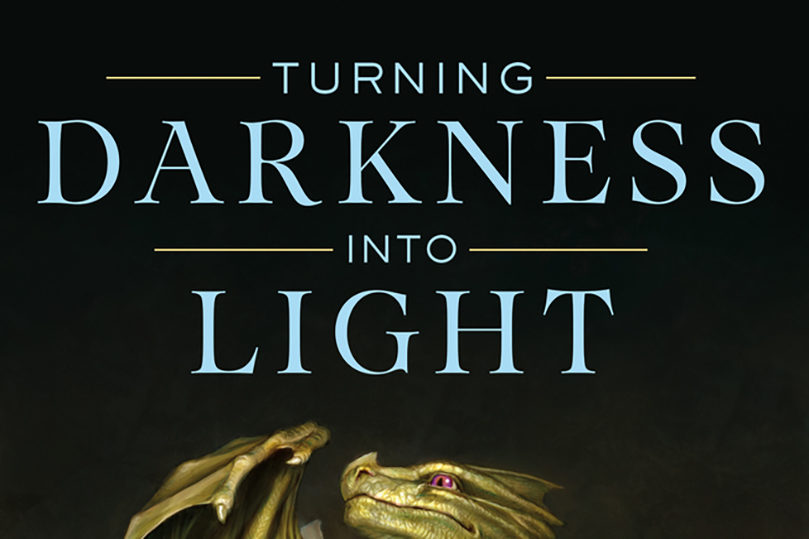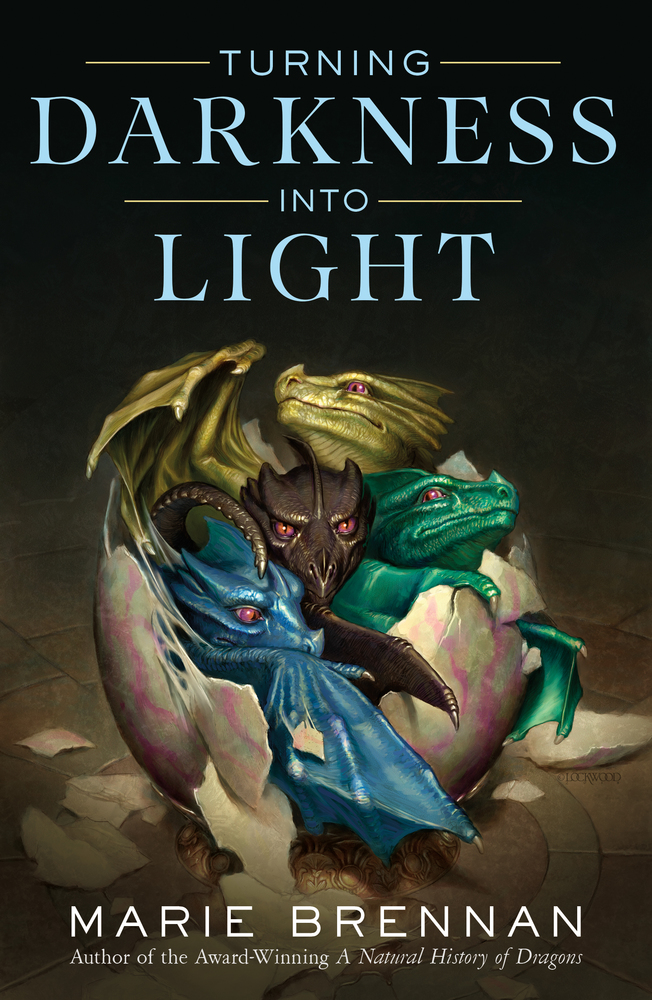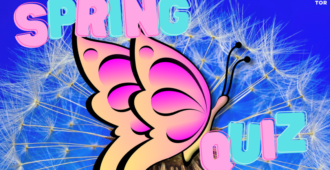As the renowned granddaughter of Isabella Camherst (Lady Trent, of the riveting and daring Draconic adventure memoirs) Audrey Camherst has always known she, too, would want to make her scholarly mark upon a chosen field of study.
When Lord Gleinheigh recruits Audrey to decipher a series of ancient tablets holding the secrets of the ancient Draconean civilization, she has no idea that her research will plunge her into an intricate conspiracy, one meant to incite rebellion and invoke war. Alongside dearest childhood friend and fellow archeologist Kudshayn, must find proof of the conspiracy before it’s too late.
Turning Darkness Into Light is on sale August 20. Please enjoy the following excerpt and head to Tor.com to read an earlier excerpt.
Excerpt
From the notebook of Cora Fitzarthur
A new woman has come to Stokesley. I knew someone was going to visit, but Uncle didn’t tell me ahead of time that she will be living here for months, which is very inconvenient of him. The good news is that she doesn’t have a little yappy dog that will shed all over everything like our last houseguest. (The dog was the one shedding, of course, not the houseguest.) I told Mrs. Hilleck to put her in the lilac room and to find out what she likes to eat.
Her name is Audrey Isabella Mahira Adiaratou Camherst. She is twenty-three years old, and Uncle has hired her to translate the tablets. I saw her going into dinner, though she did not see me.
Uncle says it is very important to know who someone’s people are, so last night I looked hers up in Webber’s Almanac of the Peerage and Other Illustrious Persons of Scirland. It says she is the granddaughter of Isabella Trent, née Hendemore, formerly Camherst, 1st Baroness Trent, who is a dragon naturalist, and both very famous and very scandalous. (The almanac does not say she is scandalous, but I know that much myself.) Audrey’s paternal grandfather was Jacob Camherst, second son of a baronet. Her step-grandfather, if that is a proper word, is Suhail, Lord Trent, who is Akhian, and an archaeologist and linguist. He is also famous, though less so, and not very scandalous. Her father is The Honourable Jacob Camherst, an oceanographer. Her mother is Kwenta Adiaratou Shamade, of the Talu Union, an astronomer. That explains why Audrey is a dark brown colour, except her hair, which is black and looks like a cloud when she lets it free. Her maternal grandparents are not in the almanac, probably because they are neither peers nor Scirling.
I don’t know why it is important to look these things up. The almanac has no entry to tell me whether they are the Right Sort of People. I don’t think Uncle believes they are, though.
My instructions are to help Audrey in any way she tells me to (even if all she tells me to do is fetch her tea) and to read all of her letters before they go to the post, and to tell Uncle if she tells anyone anything about the tablets, or if she says anything unkind or suspicious about him. The letter Audrey has written to the Tomphries Museum only says that she has arrived here and that Lord Gleinleigh is exactly as she expected, which might be rude depending on what she expected, but I don’t think that’s the kind of thing Uncle had in mind. Still, I suppose I should tell him, just to be sure.
From the diary of Audrey Camherst
5 PLUVIS
Lord Gleinleigh is not at breakfast. How inconvenient of him! The footman says he does not often take breakfast. I wonder if he is even awake yet? He spends a great deal of his time on the Continent; perhaps he has acquired the Continental habit of keeping late hours. I did my best to sleep in until what most people would consider a civilized time, but after so much of my life on ships with Papa and Mama, the habit of waking at daybreak is difficult to shed.
Someone must be up, though, or else the servants pinched bits of the food on the assumption that no one would be eating it. Who else is here, I wonder?
LATER
Well, that’s several questions answered at once. But what I think of the answer, I am not yet sure.
When I was done with breakfast I went straightaway to the library, where Lord Gleinleigh had promised the tablets would be laid out for me. I was half convinced he would have failed to do so—or possibly “failed”—because surely he could not let me see them without him present to gloat over his trophy. But there they were, set in an organized row on a sheet to protect the long table that dominates the center of the room. (Why does a man who cares so little for actual learning have such an enormous and well-stocked library? Prestige, I suppose.)
I pinned my hair up and began to examine the array. That room needs better lighting; I have already pestered the foot-man to bring me a lamp with a long enough cord that I may drag it around as I require. To begin with, though, I had to carry one of the tablets to the window, so I could see it clearly.
And then I found myself grinning like a monkey, because there I was, with a priceless treasure in my hands! Of course it is not the first time that I have handled a Draconean text. I will never forget the day Grandpapa first put a clay tablet into my hands, explaining to me that I was holding history itself. I was five, I think, which always horrifies people when they hear— what if I had dropped it? The tablet was only a tax record. Still a loss if I had shattered it, mind you, but not one that would haunt me until the end of my life.
It would haunt me until the end of my life and beyond if I dropped one of these. Our modern Draconeans do not know everything about their ancestors, the Anevrai, any more than I know what ancient Scirlings or Utalu did or thought. We have only these fragments, the texts that happen to have survived the Downfall of their ancient civilization. I am sure the people who rebelled against Anevrai rule had very sound reasons for it—but if I could, I would go back in time and ask them not to destroy so much in the process. No matter how tyrannical their rulers were, what gain was there in burning down palaces and cities? Who benefited, when they smashed the texts that held all the learning of their world? They plunged themselves into a darkness so deep that we are only beginning to shine lights into the nearest corners of it.
The lump of clay I held in my hands today might prove to be a very bright light indeed. I tilted it back and forth, letting the light bring out the faint impressions where the scribe’s fingers had once gripped the edges, before it was fired. I would be the first to read his words!
. . . or so I believed at the time.
I had just sat down at the center of the table to write some preliminary notes when someone behind me said, “That’s my chair.”
If I tell this story later I shall describe myself as turning around with flawless poise and composure, but the truth is that I squeaked. The speaker was a girl—well, I call her a girl; I think she is only a few years younger than I am. But she was dressed very plainly, in a dove-grey frock I would have said was ill-fitting; only later did I realize the tailoring was not at fault. She held herself so awkwardly that it made the dress look like a sack. And since I am a terrible judge of fashion, I can only think that she will have an appalling time of it when she comes out—if indeed she ever does.
“That’s my chair,” she repeated, clutching a notebook to her chest.
She clearly was not a servant. I rose and said, “Are you . . . Lord Gleinleigh’s daughter?” He is not married, but she might have been his natural-born child. Only there is no polite way to ask whether someone is a bastard.
“I’m his ward,” she said. “I sit there every day while I work on the translation.”
“On the—” It turned into another squeak, only this one was decidedly angrier.
I thought—Simeon was very clear—this job was supposed to be mine! It is one thing for Lord Gleinleigh to foist this girl on me as an assistant, without so much as a by-your-leave. But it is a slap in the face for him to have her start on the work before I even arrive! And why did he say nothing of this to me last night? Likely because he knew how I would react and, coward that he is, dodged the problem by letting me stumble across this interloper while he was still warm in his bed.
She held a stack of books and notepaper clutched to her chest. Now I saw the room in a new light: the table, with its protective sheet and row of tablets. Lord Gleinleigh had not set them out. This girl had. And she sat in the very chair I had chosen and began unlocking the secrets of this cache, which was supposed to be my responsibility and privilege.
I know it is dreadful of me to write it like that. If Grandmama heard me being such a greedy little drake, she would lock me in my room without books for a week. Except she also knows how infuriating it is to be denied the proper respect—and if it hadn’t been this awkward girl who upstaged me, I think I might have lost my temper completely. (If it had been Lord Gleinleigh . . . well, I might have laughed him out of the room, because I know he hasn’t a scrap of skill for the job. But some other man like him? I would have been apoplectic.)
As it is, I can’t say I was very polite. “Let me see it, then,” I said, holding out one hand.
“See what?” But from the way she clutched her stack more tightly, I knew she understood what I meant.
“The translation,” I said. “I presume you are the assistant Lord Gleinleigh mentioned to me”—laying stress on the word “assistant.” Under no circumstances was I going to let myself be pushed into a subordinate position. “Since you have been so kind as to start on the work already, I shall look it over.”
Her jaw set in a mulish line, but she put down her stack and retrieved some pages from a folder. I was relieved to see they were so few: I was half afraid she had gone through everything already, even though I know that isn’t possible. Sitting down very pointedly in the chair she had claimed as her own, I began to read.
The pages were an utter mess, filled with crossed-out lines where she kept changing her mind, so it took me a few moments to even thread my way through the tangle and figure out what she had written—and then a few moments longer to digest the absurdity of what I had just read. It was such an incredible disaster that a part of me wanted to burst out laughing. But coming so close on the heels of my snit, it was hard for that impulse to win out, and the result is that I just sat and stared at the pages long after I had stopped reading, trying to think what to say.
Of course I could not sit there forever. I finally looked up— still without the slightest notion what I would say—and found her waiting, body rigid in that plain grey dress.
No one intelligent enough to produce even that muddle out of a Draconean text could possibly be stupid enough not to realize how bad it was. I saw in the set of her jaw a kind of challenge, as if she were waiting to see what I would say. Would I make polite noises, as if her work did not read like it had been written by a five-year-old? Or would I tear into her for having done such a dreadful job?
I found I could do neither. The gentleness of my own voice surprised me when I said, “Have you ever translated ancient Draconean before? Or the modern tongue?”
The answer came in a tight little shake of her head. Then, while I searched for more words, she spoke. “Uncle said, you like reading, and you like puzzles. You should try this one.”
As if liking puzzles qualifies one to deal with a dead language! But it sounded exactly like the kind of thing Lord Gleinleigh would say. “Have you done much translation of any kind?”
“I speak Thiessois and Eiversch,” she said.
If she’s anything like other young ladies, she only speaks them well enough to sing a few songs. “But no translation? I mean long passages.” When she shook her head again, I said, “It is quite a challenge, and although it is a bit like a puzzle sometimes, it is also very different. You . . . have made a good start here.”
Her jaw tightened again. Then she said bluntly, “It’s dreadful.”
In the face of a statement like that, tact could no longer win out over my natural candour. “It’s dreadful,” I agreed. “But even making it that far is an achievement.”
She stared at her shoes. A smile began tugging at the corner of my mouth—I could not suppress it. Then she started laughing, and that set me off, and the little knot inside me began to relax.
When we finally stopped laughing I stood up to get a chair for her. Only by the time I turned around, she’d taken my chair—her chair, I mean, as I have a feeling I’m sailing into the wind where that’s concerned. It didn’t seem worth arguing about any more, so I sat down in the one I’d pulled close.
“I’m Cora,” she said.
“And I’m Audrey Camherst.”
“I know,” she said. “I mean, figured it out. Uncle said you would be coming. But you don’t look Scirling.”
Most people don’t say it to my face like that, though I know they’re thinking it. “I’m half,” I said. “My mother is Utalu. From Eriga.”
I said that last bit because most Scirlings tend to think of Eriga as an undifferentiated mass, a whole continent lumped under one label, and couldn’t point out the Talu Union on a map if you threatened to keelhaul them for failure. But Cora nodded before I was even done clarifying. “You’re Lady Trent’s granddaughter. And your grandfather, your step-grandfather I mean, is the one who deciphered Draconean.”
“Well, him and a lot of other people. It isn’t like he just looked at it one day and said, by gum! I have it! But yes, he’s the one who translated the Cataract Stone, and theorized that the language is related to Lashon and Akhian. And then Grandmama proved him right.”
“Have you met any Draconeans?”
“Oh, yes, lots. I’ve even been to the Sanctuary.” I shuddered at the memory. “The people are lovely, but what they call ‘summer’ there would barely pass muster as a brisk spring day here.”
Cora said, “I’ve never been outside of Scirland. I don’t think I would like it very much, but Uncle travels all the time. Mostly to Thiessin and Chiavora—he didn’t like Akhia.”
All manner of uncharitable responses rose to mind at that, but I bit down on them.
“If you don’t want me to help you,” Cora went on, “then tell me. Uncle said I should do whatever you say.”
Like she’s some kind of servant! Or worse, a slave. “I do want your help,” I said. “But only if you want to help.”
She shrugged. “I don’t know how I can. You saw what happened when I tried. And it made you angry, didn’t it? That I had tried to translate something.”
The polite thing to do would have been to lie. But Cora is so straightforward that I found myself responding in kind. “Well, yes, a little. But I shouldn’t have been angry. As for translating, it usually takes years of study before anyone is ready. There are other things you can do, though—and to be honest, I’d be grateful for them. Your uncle wants this done very fast, so having someone helping out with all the side tasks would make my life a lot easier.”
She nodded, unsurprised. “When the tablets arrived, he said they’d change everything.”
Diary, I tell you: Lord Gleinleigh has a very high opinion of the import of his find, and I’m beginning to wonder why. He’s discovered a long narrative text, and that’s very exciting if you care much about ancient Draconean civilization; we’ve found a few poems before now, a few brief mythical tales or bits of history, but nothing approaching this scale. I’m sure it will teach us all manner of things we didn’t know about their society. But to say it will change everything? That seems unwarranted, when we don’t even know yet what it says.
Which makes me wonder if he somehow does know. Only I can’t think how he possibly could! It’s easy enough to get the gist of a tax record at a glance, but narrative is much more difficult, and even a few minutes of study tells me this one’s a real corker. The language is so archaic, I can’t think of many people who would even know what to do with it, and the best of them couldn’t just skim it and tell you what it says, not in any detail. I told Lord Gleinleigh I could get through two tablets a month; I only hope I can keep my word. So how could he—a man who probably doesn’t even know what a determinative is—begin to predict what effect this is going to have?
Pfah. I am putting the tail ahead of the dragon. Lord Gleinleigh just has an inflated opinion of himself, so naturally anything he finds must be stupendously important.
I didn’t say any of this to Cora, of course. I’m not that bird-witted. I just said, “Well, we’ll see. It’s going to take long hours of work before we have any real sense of what this says.”
I said the same thing again at supper tonight, to see if Lord Gleinleigh reacted, but he didn’t. We dined alone, without Cora; when I asked why, he replied only that “she doesn’t care to dine in company.” Then, oozing disapproval out every pore, he said, “I heard you were in the garden all afternoon.”
He thought I was shirking! I said, “Yes, because I began copying today. I don’t know why, but I find that natural light is best for letting me see the inscription clearly—lamps just aren’t the same.”
“Copying?” he echoed.
He didn’t even attempt not to sound suspicious. I sighed and said, in my best diplomatic voice, “The tablets may be in good condition for the most part, but they won’t remain that way for long if I’m constantly handling them. Much better to work from a copy—an exact drawing of the signs as the scribe wrote them—and only consult the original when I think there may be an error. Once that’s done, I will transcribe the text—” I saw that I had lost him. “Write out the sounds in our alphabet,” I said. “These are necessary steps, my lord, I assure you. Ask any translator and they will tell you the same.”
Lord Gleinleigh dismissed this with a flick of his hand. “No, no, quite right. I am not questioning your methods, Miss Camherst.” (He was . . . but I did not point that out.)
The footman brought out the soup course. One thing I’ll say for Lord Gleinleigh; he lays on a good feast. Though with soup I’m always afraid I’ll slurp and embarrass myself. The earl addressed his own bowl very quietly, and then unbent enough to ask, “How are you getting on?”
“Well so far. I made it a good way into copying the first tablet today.” I laughed. “Though I would have gotten further if your gardeners and footmen hadn’t constantly been interrupting to offer me a parasol. I told them that I need the direct light for my work, but they kept trying!”
“They are only concerned for your health,” he said.
And my complexion, I’m sure—as if that weren’t already a lost cause, by Scirling standards. But for pity’s sake, this isn’t Eriga or the Akhian desert. I don’t think the sun here could burn me if it tried all summer—much less in the middle of winter.
Then Lord Gleinleigh cleared his throat and said, “And what of the text itself? I know you said these other steps come first, the copying and so forth, but . . . ?”
If I let him, he will press me to do this all rumble-jumble, instead of following proper standards. Well, I shan’t let him— and I have good reason why not. “It’s difficult to say. You know” (I doubt he knows anything of the sort) “that there’s a mark in the Draconean script used to separate words, in the way we use a blank space? That’s a later innovation in their writing; earlier texts don’t have it, and this is definitely an earlier text. So while I can pick out a word here and there, a great many more all blur together, so that I’m not sure whether it says zašu kīberra or zašukī berra. I’m afraid it will be quite some time before I have anything clear enough to share with you.”
“Can Cora not help? She has been working on the tablets since they arrived.”
Obviously he hasn’t looked at any of her work, or he would know the answer to that. Well, I was not going to tell him that her efforts had made us both laugh. I merely said, “We’ll see,” and left it at that.
(Looking back over what I have written, I can hear Grandmama tsking at me. “You young people and your given names! You’ve hardly known one another three minutes before you’re addressing each other like the closest of friends.” Well, I’m not going to write “Miss Fitzarthur” every time I refer to Cora, and I don’t think she minds. That’s her surname—she must be the daughter of Lord Gleinleigh’s brother, since she calls him “Uncle.” I didn’t realize he had a brother, though. It’s shocking really, how little I know about the Scirling peerage, when I’m going to inherit Grandmama’s barony someday.)
Copyright © 2019 by Marie Brennan
Order Your Copy












